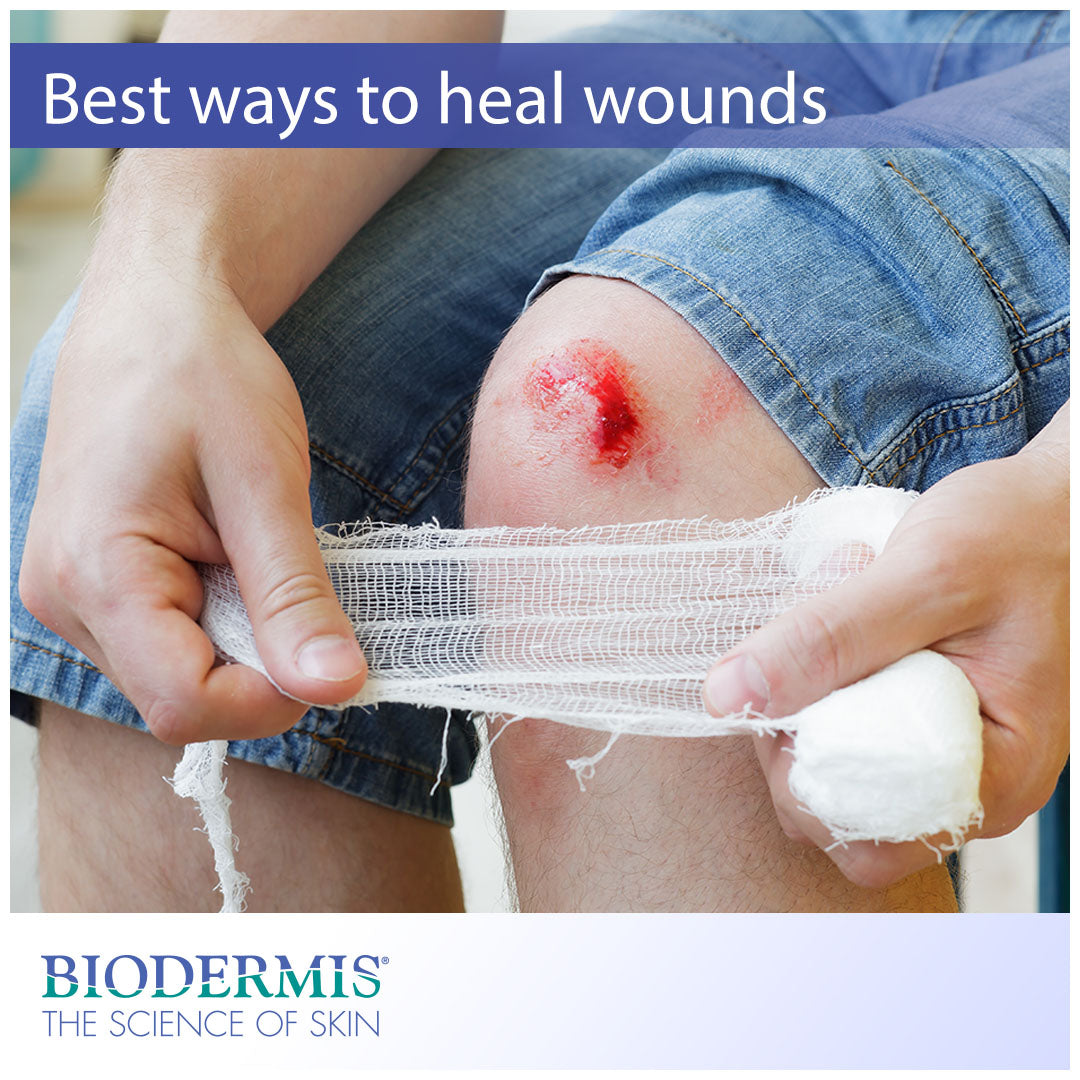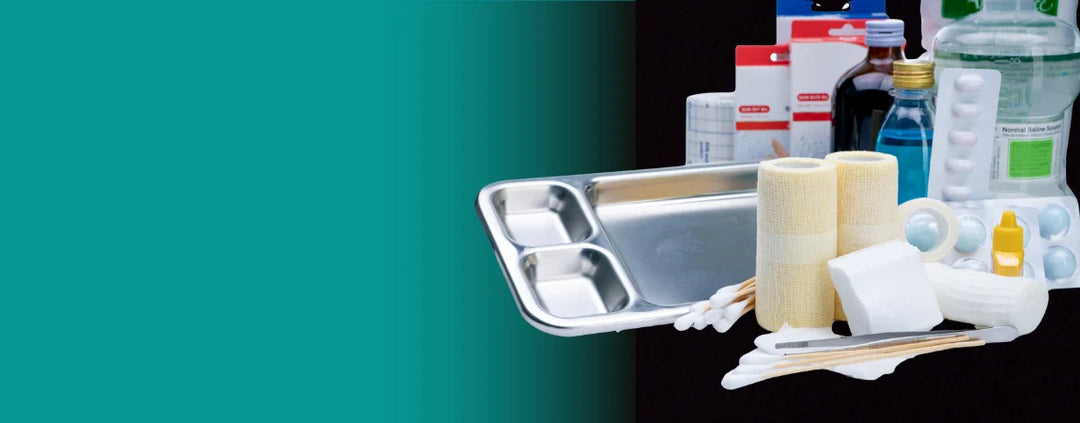Wound care is likely one of the oldest forms of medical care known to humans. Let’s face it, a person probably didn’t get very far in a pre-industrialized world when our ancestors worked to survive and doctors were scarce. Therefore, caring for a wound was paramount to survival. Nowadays, we live in a much safer world in which people have quick access to medical care and products that help their wounds heal. But what really are the best ways to promote wound healing? And what should you avoid if you wish to recover as quickly as possible and reduce scarring? There is a lot of misinformation about wound care that has been passed down through the ages, so it’s important to do your research.
Continue reading to learn more about how you can heal as quickly as possible and discover what you can do after your wound has healed to reduce scarring.
The best wound care practices
All wounds, whether from surgery or injury, follow the same wound healing process that develops in stages. These stages are hemostasis (bleeding and clotting), inflammation (redness and pain), proliferation (new tissue formation), and maturation (contraction and scarring). While all of these stages occur naturally, there are steps you can take to help them along and ensure your body heals as efficiently as possible.
Clean your wound and use antibacterial ointments
One of the very first things you should do after attaining a wound is run it under cool water. This will help wash away any dirt or germs that have already entered the open wound. It’s a good idea to maintain a clean wound every day by using a gentle soap and rinsing under cool water. After you’ve cleaned your wound and patted it dry with a paper towel, you can apply an antibacterial ointment or jelly to help keep germs away.
Cover and protect your wound
You’ve just been injured and are now vulnerable to infection and illness, so it makes sense to help your body defend against harmful agents in the environment. One of the best ways to protect your wound is to cover it with a bandage or gauze. By doing this, harmful pathogens will find it more difficult to enter your cut or scrape. Protecting your wound will reduce the risk of infection and excessive scarring down the road.
Exercise and proper nutrition
It’s widely known that exercise and nutrition are two key factors for general bodily health that also assist in the wound healing process. Exercise helps with blood and oxygen flow in the body which allows for the transportation of important nutrients to the wound site. If you have a serious injury, but feel you can still exercise, try taking it slow with a walk or light stretching. You will also want plenty of fruits and vegetables, along with adequate hydration, to help the wound-healing process along.
Avoid unhealthy habits
In our hectic day-to-day lives and busy schedules, it’s easy to get caught up in unhealthy habits. Some of these habits, like smoking, drinking excessive amounts of alcohol, eating sugary processed foods, and not getting enough exercise can all decrease our bodies’ natural ability to heal. When you sustain a wound, especially a serious one, it’s important to take care of your body for a quick recovery with minimal complications.

Clinically-proven scar management
If a wound is deep enough, usually if it reaches at least the dermis (middle) layer of the skin, scarring will follow. Some people are fortunate enough to endure a wound and only be left with a thin white line as a scar. Other people may end up with a hypertrophic or keloid scar—two scar types that result from excessive collagen production. Abnormal scarring can occur as a result of genetics and a disrupted wound healing process. If you are left with excessive scarring from a surgery or injury, there are products designed to help reduce the appearance of your scar.
Silicone gel technology is a clinically-proven treatment option for reducing scars with over 30 years of evidence to support its effectiveness. Medical grade silicone is safe for all skin types and easily obtainable online or through your physician. Biodermis carries several unique silicone options that are tailored to fit your scar size—these options include silicone gel sheets, sticks, and ointments. Ask your doctor which therapy option is right for you.
Continue reading to learn more about how you can heal as quickly as possible and discover what you can do after your wound has healed to reduce scarring.
The best wound care practices
All wounds, whether from surgery or injury, follow the same wound healing process that develops in stages. These stages are hemostasis (bleeding and clotting), inflammation (redness and pain), proliferation (new tissue formation), and maturation (contraction and scarring). While all of these stages occur naturally, there are steps you can take to help them along and ensure your body heals as efficiently as possible.
Clean your wound and use antibacterial ointments
One of the very first things you should do after attaining a wound is run it under cool water. This will help wash away any dirt or germs that have already entered the open wound. It’s a good idea to maintain a clean wound every day by using a gentle soap and rinsing under cool water. After you’ve cleaned your wound and patted it dry with a paper towel, you can apply an antibacterial ointment or jelly to help keep germs away.
Cover and protect your wound
You’ve just been injured and are now vulnerable to infection and illness, so it makes sense to help your body defend against harmful agents in the environment. One of the best ways to protect your wound is to cover it with a bandage or gauze. By doing this, harmful pathogens will find it more difficult to enter your cut or scrape. Protecting your wound will reduce the risk of infection and excessive scarring down the road.
Exercise and proper nutrition
It’s widely known that exercise and nutrition are two key factors for general bodily health that also assist in the wound healing process. Exercise helps with blood and oxygen flow in the body which allows for the transportation of important nutrients to the wound site. If you have a serious injury, but feel you can still exercise, try taking it slow with a walk or light stretching. You will also want plenty of fruits and vegetables, along with adequate hydration, to help the wound-healing process along.
Avoid unhealthy habits
In our hectic day-to-day lives and busy schedules, it’s easy to get caught up in unhealthy habits. Some of these habits, like smoking, drinking excessive amounts of alcohol, eating sugary processed foods, and not getting enough exercise can all decrease our bodies’ natural ability to heal. When you sustain a wound, especially a serious one, it’s important to take care of your body for a quick recovery with minimal complications.
Clinically-proven scar management
If a wound is deep enough, usually if it reaches at least the dermis (middle) layer of the skin, scarring will follow. Some people are fortunate enough to endure a wound and only be left with a thin white line as a scar. Other people may end up with a hypertrophic or keloid scar—two scar types that result from excessive collagen production. Abnormal scarring can occur as a result of genetics and a disrupted wound healing process. If you are left with excessive scarring from a surgery or injury, there are products designed to help reduce the appearance of your scar.
Silicone gel technology is a clinically-proven treatment option for reducing scars with over 30 years of evidence to support its effectiveness. Medical grade silicone is safe for all skin types and easily obtainable online or through your physician. Biodermis carries several unique silicone options that are tailored to fit your scar size—these options include silicone gel sheets, sticks, and ointments. Ask your doctor which therapy option is right for you.
Biodermis is an innovative market leader with 30 years of expertise in the medical silicone industry. Visit Biodermis.com today to explore a complete range of scar management and post-operative care solutions.
PHYSICIANS AND MEDICAL PROFESSIONALS: REFER OR RESELL?
Biodermis offers custom tailored referral programs designed to simplify and reduce the cost of your patients' post-op care. Additionally, we offer professional pricing if you opt to retail our products. Give us a call at 800.322.3729, and we will be happy to provide additional details on these programs.



